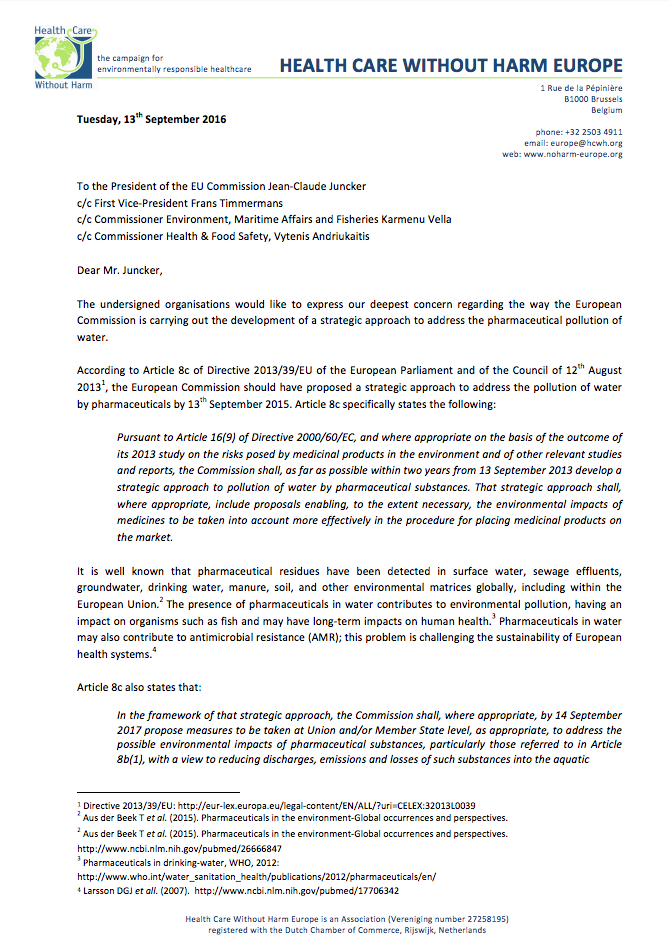European NGOs call on European Commission to follow through on their promise to address pharmaceutical pollution of water
Brussels, 14th September 2016
FOR IMMEDIATE RELEASE
Yesterday, five NGOs, representing hundreds of environmental and health organisations in all 28 European Union Member States, sent a joint letter to European Commission (EC) President Jean-Claude Junker, Vice-President Frans Timmermans, Commissioner for the Environment, Maritime Affairs and Fisheries, Karmenu Vella, and Commissioner for Health & Food Safety, Vytenis Andriukaitis, calling for immediate action and answers as to why the Commission have not yet developed a strategic approach to address the pharmaceutical pollution of water, as was promised in 2013 by an EC Directive 2013/39/EU by September 2015.
Article 8c of that directive states: “…the Commission shall, as far as possible within two years from 13 September 2013 develop a strategic approach to pollution of water by pharmaceutical substances.”1
The letter sent to the European Commission
It is well known that pharmaceutical residues have been detected in surface water, sewage effluents, groundwater, drinking water, manure, soil, and other environmental matrices globally, including within the European Union.2 The presence of pharmaceuticals in water contributes to environmental pollution, having an impact on organisms such as fish, and may have long-term impacts on human health.3 Pharmaceuticals in water may also contribute to antimicrobial resistance (AMR); this problem is challenging the sustainability of European health systems.4
In 2013, a study on the environmental risks of medicinal products5, conducted by Bio Intelligence Services for the Executive Agency for Health and Consumers, stated that: “Residues of various types of medicinal products (hormones, anti-cancer, antidepressants, antibiotics, etc.) have been detected in various environmental compartments, such as surface water, groundwater, soil, air, and biota.” The report also stated that: “this study, together with other relevant studies and reports, will provide the basis to develop that strategic approach”.
In its capacity as the guardian of the Treaty, the European Commission is required and expected to "ensure a high level of human health protection", along with consistent and coherent policymaking to support it. EU citizens have the right to access high quality, safe water in order to prevent sickness and the spread of antimicrobial resistance.6
Delaying the development of a strategic approach is putting the health of EU citizens and the European environment at risk.
Speaking about the delay, Anja Leetz, Executive Director of HCWH Europe said:
“All experts (including the UN), agree that we are facing a global pharmaceutical pollution problem and we need to minimise the release of medicine into the environment throughout their life cycle: that is, in their production, use, and disposal. It is unacceptable that the Commission is delaying any action to protect human health and the environment, allowing pollution to continue. It is unacceptable that the Commission delays the process laid down by EU law and we expect the Commission to publish the roadmap swiftly, so we can begin to address the problem of pharmaceutical pollution."
NOTES TO EDITORS:
About Health Care Without Harm (HCWH) Europe
HCWH Europe is a non-profit European coalition of hospitals, healthcare systems, healthcare professionals, local authorities, research/academic institutions and environmental and health organisations. It currently has 75 members in 26 countries from the WHO European region, including 17 EU member states.
HCWH Europe works to transform the healthcare sector worldwide so that it becomes more ecologically sustainable and a leading advocate for environmental health and justice across the globe. We bring the voice of healthcare professionals to the European policy debate about key issues such as chemicals, climate change and health, green building, sustainable procurement, pharmaceuticals, sustainable food and waste management. (www.noharm-europe.org)
About the European Environmental Bureau (EEB)
Created in 1974, the European Environmental Bureau is now the largest federation of environmental citizens’ organisations in Europe. It currently consists of over 150 member organisations in more than 30 countries (virtually all EU Member States plus some accession and neighbouring countries), including a growing number of European networks, and representing some 15 million individual members and supporters.
We stand for environmental justice, sustainable development and participatory democracy. Our aim is to ensure the EU secures a healthy environment and rich biodiversity for all.
About the European Public Health Alliance (EPHA)
EPHA is a member-led organisation made up of public health NGOs, patient groups, health professionals and disease groups, working to improve health and strengthen the voice of public health in Europe.
Our actions and campaigns reflect our values: equity, solidarity, sustainability, universality, diversity and good governance.
Since formal establishment in spring 1993, EPHA has built a solid network of over 90 members dedicated to provide better health for all.
About the Health and Environment Alliance (HEAL)
HEAL is a leading European not-for-profit organisation addressing how the environment affects health in the European Union (EU). We demonstrate how policy changes can help protect health and enhance people’s quality of life.
With the support of more than 70 member organisations, HEAL brings independent expertise and evidence from the health community to different decision-making processes. Our broad alliance represents health professionals, not-for-profit health insurers, doctors, nurses, cancer and asthma groups, citizens, women’s groups, youth groups, environmental NGOs, scientists and public health institutes.
About the World Wildlife Fund (WWF) Policy Office
WWF’s mission is to stop the degradation of the planet’s natural environment and to build a future in which humans live in harmony with nature, by:
- Conserving the world’s biological diversity
- Ensuring that the use of renewable natural resources is sustainable
- Promoting the reduction of pollution and wasteful consumption
The European Policy Office contributes to the achievement of WWF’s global mission by leading the WWF network to shape EU policies impacting on the European and global environment.
[1] Directive 2013/39/EU: http://eur-lex.europa.eu/legal-content/EN/ALL/?uri=CELEX:32013L0039
[2] Aus der Beek T et al. (2015). Pharmaceuticals in the environment-Global occurrences and perspectives. http://www.ncbi.nlm.nih.gov/pubmed/26666847
[3] Pharmaceuticals in drinking-water, WHO, 2012: http://www.who.int/water_sanitation_health/publications/2012/pharmaceuticals/en/
[4] Larsson DGJ et all. (2007). http://www.ncbi.nlm.nih.gov/pubmed/17706342
[5] Study on the environmental risks of medicinal products: http://ec.europa.eu/health/files/environment/study_environment.pdf
[6] Charter of Fundamental Rights of the European Union (2012): http://eur-lex.europa.eu/legal-content/EN/TXT/?uri=CELEX:12012P/TXT

